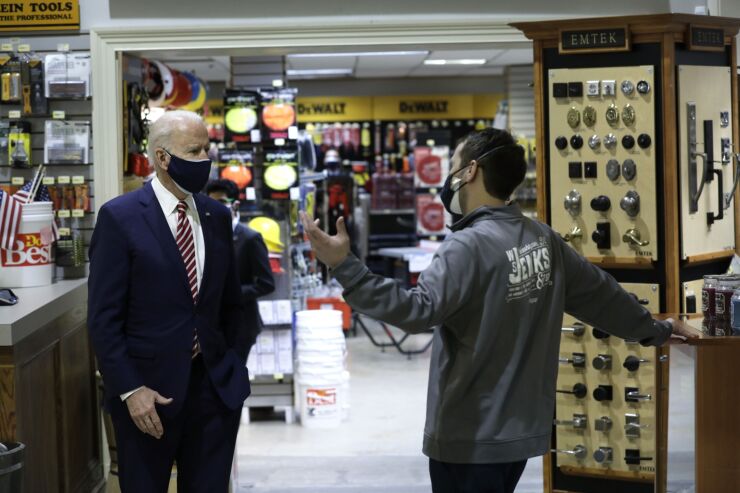The House is poised to send the $1.9 trillion COVID-19 relief plan to President Joe Biden for his signature, providing an economic boost that will last long after $1,400 stimulus checks start arriving in Americans’ accounts this month.
With four days until supplemental unemployment benefits begin running out, House Democratic leaders are planning for passage Wednesday. While a Republican congresswoman delayed the schedule, the final vote is still expected in the afternoon.
The bill is far bigger than initial Wall Street expectations of what could be accomplished in a closely divided Congress. It provides a template for a potential longer-term expansion of an American social-safety net that has long been much smaller than its European counterparts. Democrats say the near-$110 billion temporary expansion of the child-tax credit will help cut child poverty in half, while tax forgiveness on jobless benefits and student-debt relief will give help to millions more.

Economists this week were upping their projections for growth to incorporate the impact. Morgan Stanley on Tuesday raised their 2021 forecast for U.S. economic growth to 7.3 percent from 6.5 percent, a pace unsurpassed since the Korean War boom in 1951. The OECD the same day more than
Hiring plans rebound
“It seems like every week, we get another reason to lift the forecast,” said Avery Shenfeld, chief economist at the Canadian Imperial Bank of Commerce. “Vaccinations will release a lot of saved spending, in addition to whatever spending we get from this round of stimulus checks.”
White House Press Secretary Jen Psaki said Tuesday that the government won’t have the checks — in the amount of $1,400 for each individual, phasing down to zero for those earning $80,000 or more — printed with Biden’s name on them, as the Treasury seeks to accelerate their distribution.
The IRS is prepared to begin sending the payments within days of the bill being signed, according to a person familiar with the process who isn’t authorized to comment on the timing because it is not yet finalized.
The nonpartisan Congressional Budget Office
Sustained boost
That sustained flow of spending can be seen in growth forecasts. The median of estimates compiled by Bloomberg for 2022 is 3.8 percent — an expansion well in excess of the 2.3 percent average over the decade through 2019.
Shenfeld is among economists seeing a return of full U.S. employment next year, with a jobless rate of 3.8 percent, though the median projection is 4.6 percent, above pre-pandemic levels.
“This legislation represents the boldest action taken on behalf of the American people since the Great Depression,” said House Democratic Caucus Vice-Chairman Pete Aguilar of California.
The Senate passed the bill — which includes $160 billion for vaccine and testing programs, $170 billion to help schools open and more than $360 billion in aid for state, local and territorial governments — on Saturday in a 50-49 party-line vote. The House is also expected to pass it without Republican backing.
Republican objections
GOP lawmakers have blasted the price tag as well in excess of what’s needed, given that the economy is already bouncing back as the coronavirus recedes amid the strengthening vaccination drive. With Treasury yields soaring over the past month, they also point to deepening fears of an upsurge in inflation, with dangerous results given America’s heavy debt load.
“You can’t just keep adding mountains of debt at hundreds of billions at a time” without consequence, said House Republican Whip Steve Scalise of Louisiana, the lawmaker in charge of corralling GOP votes. He blasted what he called House Speaker Nancy Pelosi’s pursuit of a “socialist” agenda and rejection of talks with “those of us who want to work together to confront this virus and to safely reopen our economy and our schools.”
Wednesday’s vote on the bill will be delayed at least an hour by a motion from Republican Representative Majorie Taylor Greene to force the House to adjourn. She has regularly forced such votes since majority Democrats voted to remove the
A group of 11 Republican senators proposed a $650 billion stimulus bill, with more narrowly targeted benefits and a focus on anti-virus efforts. Biden hosted most of the group at the Oval Office only to say the gulf between his vision and the GOP was just too large to try to bridge.
By contrast, Democratic progressives had sought even more than Biden proposed. Pramila Jayapal, who heads their caucus, had called for
Pelosi said Tuesday the relief bill was the most important she had shepherded since Obamacare in 2010. She also predicted that there won’t be the political backlash of that episode — when Republicans successfully made the case against deficit spending and took control of the House in midterm elections.
“The public knows” about what’s being provided in the relief bill, she said. “The public didn’t know about the Affordable Care Act and the administration was not exactly advertising.”
Help is targeted toward the lowest-earning Americans. A
“This will probably hit accounts before the end of the month,” said Aneta Markowska, chief economist at Jefferies LLC. “Not only does this get paid out quickly, it actually gets spent very quickly.”
— With assistance from Laura Davison and Carl Riccadonna (economist)





